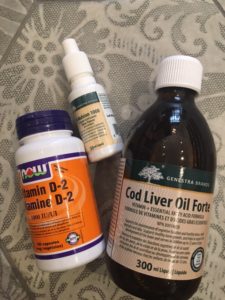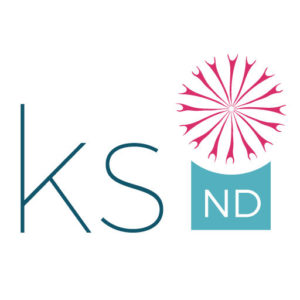Vitamin D should be on your radar. You’ve probably heard about this sunshine vitamin before, but here is all that you really need to know to be informed and proactive with your health!
Evidence clearly links the importance of vitamin D to bone health and osteoporosis, but other emerging areas of interest also include immunity, chronic diseases such as cardiovascular disease and cancer, as well as colon, breast, neuromuscular health.

The Inconvenient Truth: Rates of insufficiency are high in Canada, due to low levels of sunlight during the winter months. Sunlight (UVB) is required to convert pre-vitamin D into Vitamin D3. That’s not the end of the story though. Next, the liver must convert vitamin D3 into calcidiol (25-OH vitamin D) and finally the kidneys transform calcidiol into calcitriol (active vitamin; 1, 25-OH D3 form). As you can see this is a multi-step process and involves healthy functioning organ systems for full synthesis and conversion.
Plant forms of vitamin D2 are called ergocalciferol, and are most commonly produced via yeast for supplement production, and can be used by vegans. Supplementing with vitamin D3 (cholecalciferol) is my preference, and this is produced from fish, eggs and meat. Sunlight plays a key role in production, but so does the liver and kidney function.
To make matters trickier, vitamin D is not found in many foods, naturally, unless those foods have been fortified. Cod liver oil contains the most concentrated amount of food sourced Vitamin D with approximately 1000 IU/tablespoon. The next best options are swordfish and salmon with about 500IU/3oz of fish. Fortified orange juices and milk have a very modest amount at about 115-125IU/1 cup, respectively. The truth is, unless you’re a BIG fan of cod liver oil, or taking a high quality supplement, you’re likely not getting enough vitamin D from November to April (during which sunlight and skin exposure are limited).
Testing for Vitamin D Status
Your family physician and naturopathic doctor are both able to test for blood levels of vitamin D, although this is not a routine test. Unfortunately OHIP no longer covers the cost of Vitamin D testing for most patients. This means you will have to pay out-of-pocket for this test (Cost is approximately $35). The Ontario Health Technology Advisory Board does not recommend routine screening for vitamin D insufficiency (and OHIP will only cover your cost if) unless you meet the exception criteria below:
- Rickets disease, Osteoporosis, Osteopenia
- Kidney disease
- Malabsorption syndromes such as: Crohn’s, celiac disease, gall bladder removal or colonic resection or gastric bypass surgery
- Or medications that reduce vitamin D synthesis and metabolism such as: corticosteroids, cholestyramine, orlistat, chronic laxative use, anti-seizure medications (this list is not exhaustive).
A Word To The Wise: Vitamin D is a fat soluble vitamin, which means that your body will store this vitamin up rather than flush it through. This means that there is a greater risk for toxicity with this vitamin. The RDA for this vitamin is 600IU per day. Doses beyond this value can be safe, but should always be monitored, with limited duration, and only taken when prescribed by a doctor. Because vitamin D increases calcium absorption from the intestines, it can cause too much calcium in your blood (hypercalcemia) which presents with the following symptoms:
- Nausea, vomiting, and/or loss of appetite
- Frequent urination
- Kidney problems
- Weakness (muscular)
The Bottom Line: Vitamin D insufficiency is common in Canada. Vitamin D plays a crucial role in many bodily functions including neuromuscular health, bone health, immunity, gut health, and chronic disease prevention. Unless you’ve asked for testing, you’ve likely not been tested as OHIP no longer routinely covers this assessment. Be proactive with your health and ask for testing with your ND or family doctor today! Speak to your prescribing doctor about safe doses, and be sure to ask for re-testing if you’ve been supplementing for more than three months. Never take high doses without a doctors supervision.
 Dr. Kristin Spark, BSc, B.Nat, CISSN, Naturopathic Doctor sees patients at: The Golden Mean Wellness Shoppe on Tuesdays & Thursdays, and at Flow Health and Wellness on Wednesdays, Fridays & Saturdays, and Waterloo Sports Medicine on Wednesday mornings. For information about appointments, or to book your appointment, click here
Dr. Kristin Spark, BSc, B.Nat, CISSN, Naturopathic Doctor sees patients at: The Golden Mean Wellness Shoppe on Tuesdays & Thursdays, and at Flow Health and Wellness on Wednesdays, Fridays & Saturdays, and Waterloo Sports Medicine on Wednesday mornings. For information about appointments, or to book your appointment, click here
The content provided is not intended as health or medical advice, diagnosis, treatment or a prescription. Always seek the advice of your medical provider with any questions you have regarding medical conditions. Dr. Kristin Spark, Naturopathic Doctor is released from any liabilities resulting from the use of information contained here.

 At the root of preventative healthcare, is education. Let me help you stay informed to find your highest health potential. Information provided on this website is for educational and promotional purposes only, and does not serve as, or replace, medical recommendations, treatments or prescriptions.
At the root of preventative healthcare, is education. Let me help you stay informed to find your highest health potential. Information provided on this website is for educational and promotional purposes only, and does not serve as, or replace, medical recommendations, treatments or prescriptions.
Tһаnks veгy nice blog!